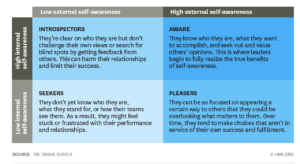I read a very well written article on HBR lately. On paper, it is neither related to advertising nor marketing directly but I think it can easily be linked to Brand Building and Marketing Strategies.
Before we build that link, let’s give justice to the content and to its intentions. The article is about the importance of self-awareness in leadership and how to work with it. It helps the reader to acknowledge the types of self-awareness and how to improve -especially- the external one: Being aware of how people perceive us. It is such a good read, especially if you are interested in how to give and take good feedback. My favourite part was the last part about introspection. It is about how to learn from your own experiences with the right question. The author highlights the danger of asking WHY questions to prevent your emotions, biases and assumptions get you. She recommends to go with the WHAT questions to be more objective in your investigation about how to improve your own actions and reactions. It is very intuitive and basic if you think about the fundamentals of external feedback templates and practices. We all have STARs or action-oriented feedback templates to avoid giving feedback that feels personal. However, when it comes to our own selves, and self criticism; we either find us in a flight, freeze, freak, fight situation, or worse – in a denial, depression, negotiation stage… Why does it happen that way? Erm, oops – wait a second: What makes us be a ‘child’ rather than a ‘professional’ when we are cultivating an introspective feedback?
I think the answer is clear, but I will not go into its psychological aspects; since I am quite illiterate in that area, I better keep talking about brands…
So how is it related to brands?
We’re living in an era where everyone is talking about brand Purposes. So the old 4Ps are already exploited and saturated, we have new ones: purpose, precision, pride, partnership, protection, pace, personalisation… And among all these beautiful Ps, purpose became the most popular – since it gives employees a warm&fuzzy feeling, I assume.
However, as we discussed together before (here, there, now, then, ever, before) your Purpose may not be a thing if that Purpose is only a marketing stunt. If you cannot own it, you cannot deliver it. If you cannot deliver it, you cannot convince anyone… Again, going back to self awareness need: If you are pretentious, your decision making cannot be authentic and you make mistakes which cannot be internalised. And you either deny them, or you fight with your own self…
That is exactly what happens to brands as well. If they do not have the self-awareness themselves they cannot know how to own a cause, a purpose, a belief or a statement; they are destined to make a mistake and cause a PR disaster to ruin their reputation. Going back to Tasha Eurich’s article, you need to be :


To frame it simply:

Putting effort in what is hot in the corporate world (eg. equal pay, diversity, transparency, flat organisations, agile organisations, baristas around…) may help you attract better talent, but being successful in business is the ultimate tool to attract the best ones.
And being successful in business can only be sustained if you’re aware of what is expected from you from your external stakeholders including your customers. Then how and when you’re going to exceed those expectations is your business problem to solve. But that is the most important problem to solve. The rest can and should follow that decision.
So your problems about your acquiring new consumers through marketing activities cannot be solved in isolation. You either love and embrace your customers or you lose them.
Therefore you better ask WHAT kind of a relevant purpose we can own together with internal and external stakeholders… instead of WHY your expensive advertising does not work anymore…